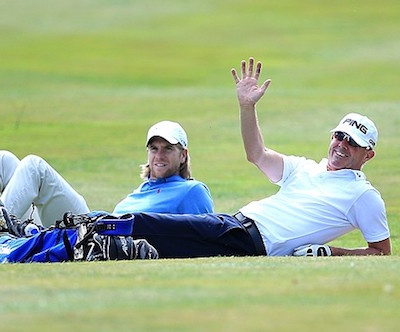R&A active on slow-play issue; now it must follow through
01 Dec 2015
by Golfweek
SHARE:

Gary Hendley and Ben Daniels at the PGA Four-Ball
( Getty Images )
Well done to the R&A for dealing with the thorny issue of slow play at its recent "Time for Golf" conference in St. Andrews.
Now comes the litmus test: will the governing body and other organizations act on the suggestions made during the two-day forum at the Home of Golf?
They'd better or else the game is pretty much doomed.
New R&A chief executive Martin Slumbers has made no bones about his desire to eliminate this perennial problem from the game.
“We know that the time it takes to play golf is one of the barriers preventing many people from getting involved in the sport,” Slumbers said. “It isn’t a problem that we can solve overnight, but it is clear that we must focus on making golf more enjoyable to play and watch.”
Two prominent conference delegates believe Slumbers will deliver, that what was discussed at St. Andrews wasn’t just hot air.
Nigel Edwards, Great Britain & Ireland's Walker Cup captain, is convinced that action will result from the two-day forum. The Welshman, who is performance director for England Golf, gave a presentation on how slow play affects the amateur game.
“There were a lot of relevant points on a lot of issues affecting the game, from the grass roots to elite golf,” Edwards said. “There was much that can be acted upon – if not tomorrow then in the near future.
“There is a definite appetite to deal with slow play. Martin Slumbers made it clear he’s very keen to act.
“We have to act, especially at the professional level. Professional golf is all about entertainment. We want to entertain people, bring new people into the game and that’s not going to happen if it’s too slow. So it’s in all our interests to speed up.”
PGA master professional Denis Pugh gave a presentation on pace of play and performance along with performance coach Karl Morris and tour players Rebecca Hudson and Stephen Gallacher. Pugh, coach to European Tour pros Ross Fisher and Francesco Molinari and formerly to Colin Montgomerie, arrived in St. Andrews not entirely convinced anything would change. He left in an upbeat mood.
“I wasn’t totally cynical, but I was a little skeptical,” Pugh conceded. “We didn’t just talk theory; we talked statistics and the factors affecting slow play. There was a lot of research I’d never seen before, and people like me who’ve been in the game a long time left feeling we’re going to get to the bottom of this now. I came away really positive.
“Already there is an R&A manual that is going out to organizations and every club next year with R&A and USGA solutions to problems that affect pace of play. There will be practical steps to deal with problems that result in slow play.
“The conference was really geared to providing practical information and ideas to make play quicker. We didn’t just talk.”
Gallacher and Hudson suggested practical solutions to speed up the game. Like many, both want to eliminate financial penalties in the professional game and institute stroke penalties instead. Gallacher, a three-time European Tour winner, also suggested cutting the five-minute time limit looking for lost balls to three minutes. Hudson, a four-time Ladies European Tour winner, wants to see all professional tours adopt spot checks on players, and apply penalties for any bad time rather than wait for players to fall out of position.
I’d love to share Edwards and Pugh’s optimism, but I’ll wait to see if the pudding produces the proof, thank you very much.
Nearly 20 years ago, I traveled to the Auld Grey Toon for a St. Andrews Links Trust seminar on time management. It was held just before a major conference on pace of play.
On that occasion, the R&A and other bodies spent a few days talking about slow play and then did practically nothing. The game didn’t speed up afterwards. It slowed down to its present near-glacial pace.
This time there seems to be an appetite for change. That appetite had better be ravenous because the time for talking is over.
We’re already into the realms of the six-hour round. If we don’t act now then we can kiss goodbye any thoughts of growing the game.
Over to you, Mr. Slumbers. Don’t let us down.
By Alistair Tait of Golfweek